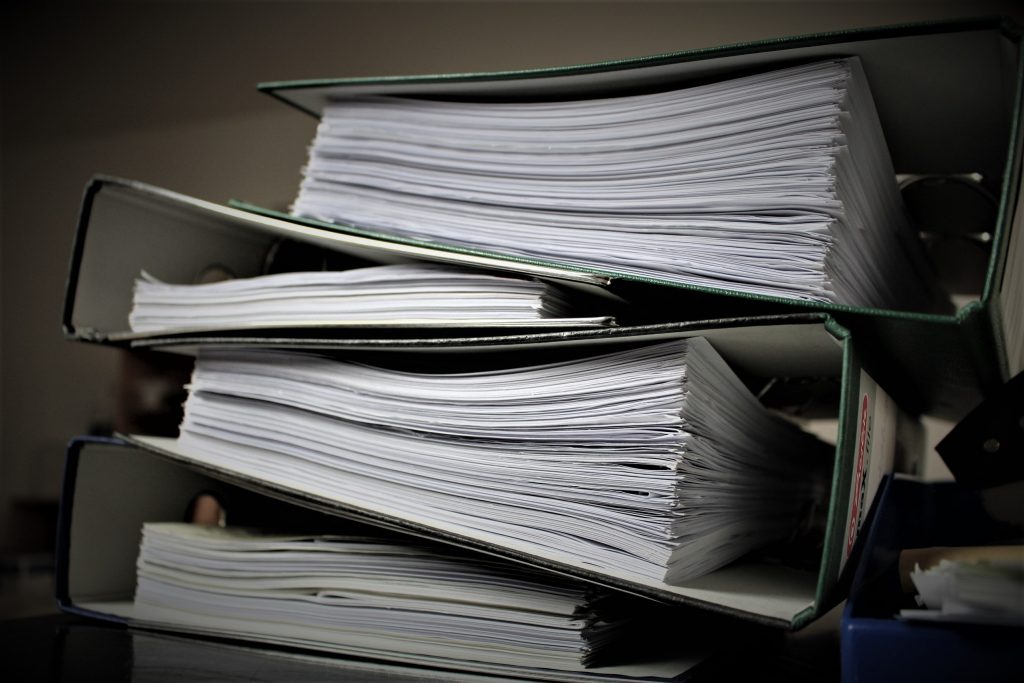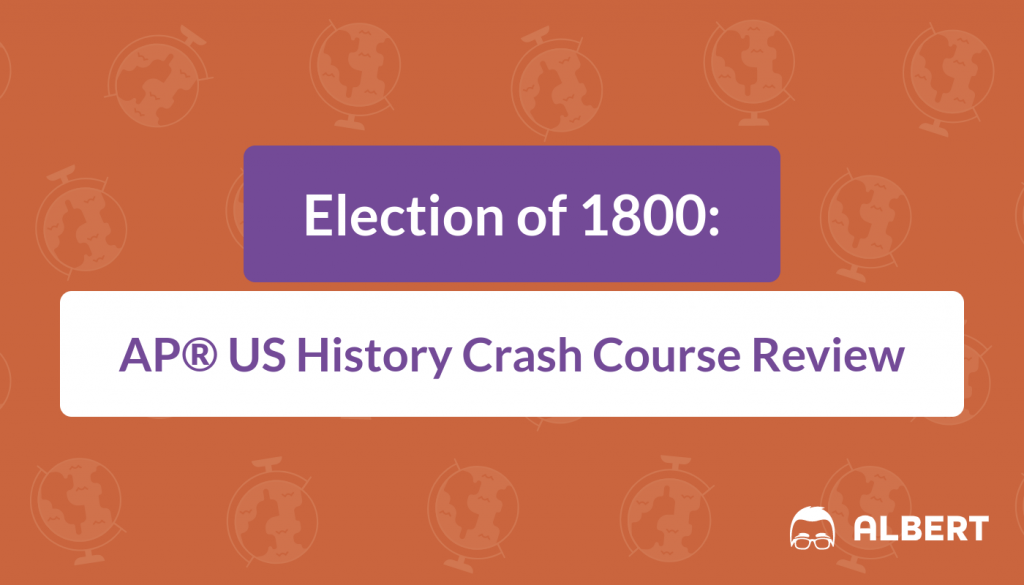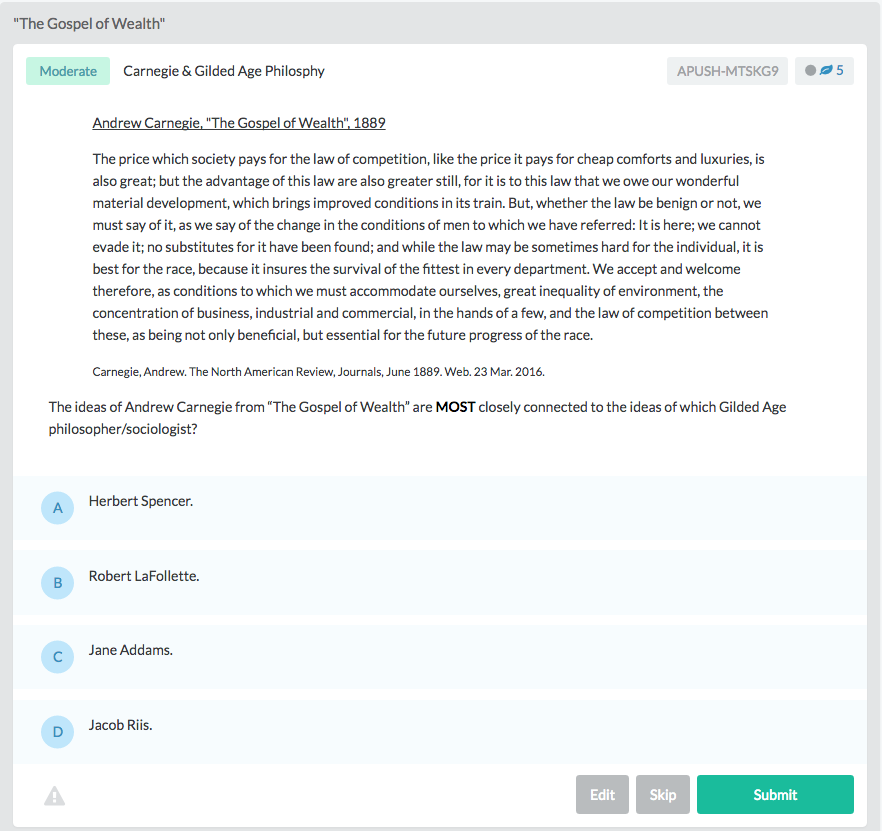If you’re in an AP® United States History course, you’ve studied a lot of elections, and you know they’re an important piece of the APUSH exam. It can be hard to keep them all straight, but with a little bit of help, you can master the details, results, and impact of the major presidential elections. With this APUSH crash course review, we’ll look at one of the most stand-out elections in American history: the election of 1800.
What is the Election of 1800?
In 1800, Vice President Thomas Jefferson ran against incumbent President John Adams in the fourth presidential election. Jefferson represented the Democratic-Republicans, also (understandably) known as Jeffersonian Republicans.
So what did the Democratic-Republicans stand for? In short: states’ rights. The party was strongest in the south, which makes sense – it was founded by Jefferson and his good pal James Madison, both from Virginia. Plus, the D-R Party fought for the power of the agrarian people who helped build the United States, not just the power of the wealthiest Americans.
Democratic-Republicans were also committed to the ideals of republicanism, which sought to decrease the role of the national government. In contrast, the John Adams’s Federalists believed in a strong central government and had a lot of support in the northeast.
Another important point of contention was the French Revolution. The Federalists opposed the Revolution and didn’t want America to get tangled up in it. However, the Democratic-Republicans supported the popular forces in the French Revolution and were in favor of American assistance.
Jeffersonian Republicans had an advantage in terms of organization – at the state level, their propaganda and campaigning were a well-oiled machine. Unfortunately for the Federalists, their party was more disorganized, and it hurt even more when two of its prominent leaders, John Adams and Alexander Hamilton, got into a pretty big fight and took sides within the party.
After a long campaign of mudslinging – Jefferson was accused (rightly) of having illegitimate children, and then turned around and called Adams a hermaphrodite – the Jeffersonian Republicans took the White House.

Image Source: Wikimedia Commons
Why is the Election of 1800 Important?
The election of 1800 is sometimes called the “Revolution of 1800,” and with a name like that, it’s hard to ignore. Until this election, the Federalist Party had been the only one in office; in fact, there would never be another Federalist President after John Adams’s defeat.
The election process itself had lots of problems, especially with the Electoral College. These were the early election days, when the government was still working out the voting system kinks. Through this election, they found a flaw in the original Constitution: members of the Electoral College could write in two names for president, not just one.
So what happened? Every elector who voted for Jefferson also voted for his running mate, Aaron Burr. Oops. The vote was split, so it went to the House of Representatives, where the tiebreaker went to Thomas Jefferson. It wasn’t an easy decision, though – it took until the 36th vote to actually give Jefferson a majority.
After that long process, legislators decided something had to change. Bring in the Twelfth Amendment. That’s the one that stipulates electors must distinguish between their choices for President and Vice President on their ballot.
Another key fact about the election of 1800: the three-fifths compromise had a serious impact on the results. Remember, this clause counted each slave as three-fifths of a person for legislative and voting distribution purposes. Before this compromise was reached, slaves were not counted at all. With most of the Democratic-Republican support coming from the southern slave states, Jefferson got much of the slave vote. Without these votes being counted – even as only three-fifths – Jefferson would not have won the presidency.
One more important part of the election of 1800 was the debate over the Alien and Sedition Acts. These were four laws passed by a Federalist Congress under President John Adams. The Alien Acts made naturalization more difficult for immigrants and allowed the President to deport dangerous or enemy non-citizens. The Sedition Act criminalized making false statements that criticized the government.
Why was this important to the election of 1800? Well, Jefferson and Adams definitely didn’t agree on the Alien and Sedition Acts. Adams and the Federalists argued that they strengthened national security. Really, though, they needed the laws to stop the Democratic-Republican Party from growing – many immigrants were drawn to the Jeffersonian Republicans, so they contributed to the D-R vote. Democratic-Republicans thought the acts were a threat to individual liberty.
Overall, the election of 1800 was important because it marks the beginning of the development of political parties and the two-party system in America. The peaceful transfer of power from one party to the other showed Americans that their new country could unite and work for the good of the nation.
What You Need to Know for the APUSH Exam – Multiple-Choice
Because of its impact on the political party system, contentions after the Revolutionary War, and Constitutional reforms, the APUSH exam loves to ask about the election of 1800 on the multiple-choice section. Questions could be about the immediate impact of the election, mudslinging, or the election’s key players.
Multiple-choice questions could also deal with the differences between Jefferson’s Democratic-Republicans and Adams’s Federalists. Make sure you are familiar with the parties’ stances on American neutrality, mass democracy, the national bank, and the power of the federal government.
Here is an example of a past APUSH multiple-choice question:
When Thomas Jefferson said in 1801, “We are all republicans – we are all federalists,” he meant that
- Americans would never ally themselves with monarchical governments
- Federalists would be appointed to his cabinet
- The two parties’ platforms were identical
- The principles of American government were above party politics
- He admired Hamilton’s policies
Correct Choice: D. Although party politics were emerging, President Jefferson emphasized that American unity was the most important thing to focus on. We know that A is not the correct choice because even though Jefferson didn’t support the French government during the revolution, he did not make a statement against all monarchies. He did not appoint federalists into his cabinet, so B is also incorrect. Choices C and E must be wrong because the Democratic-Republicans and the Federalists disagreed on nearly every major issue.
What You Need to Know for the APUSH Exam – Essays and Document-Based Questions

In the essays and DBQs on the APUSH exam, you will focus more on the impact and legacy of the election of 1800, rather than the fine details. Bring in your knowledge of the ratification of the Twelfth Amendment, the development of the political party system, and campaigning strategies (some of the documents could have to do with mudslinging).
Here is an example of a past Free-Response Question from the APUSH exam:
To what extent did political parties contribute to the development of national unity in the United States between 1790 and 1840?
In an FRQ like this one, you will need to discuss the major differences between the Federalist Party and the Democratic-Republican Party. Also, make sure you touch on the key players – Adams and Alexander Hamilton on the Federalist side (along with George Washington), and Jefferson, James Madison, and James Monroe for the Democratic-Republicans.
The Election of 1800 will be a key part of your essay. Jefferson’s statement “We are all Republicans, we are all Federalists” would be a great source of outside evidence for national unity. Discuss the peaceful transfer of power between parties, and the sentiment behind the “Revolution of 1800.”
On the other hand, you could argue that at the historical moment of this election, political parties in fact did not contribute to national unity. You could write about the massive differences in the parties’ beliefs, the regional splits, and the vicious mudslinging that forced voters into a political passion.
Above all, make sure you’re answering the prompt about the extent of national unity – make a claim for either side. Don’t just list facts about political parties; explain why they were beneficial or harmful to the public feeling of either unity or disunity.
Now that you’ve made it through our Election of 1800 crash course review, you have all the basics covered and should feel confident going into the APUSH exam in May.
Let’s put everything into practice. Try this AP® US History practice question:
Looking for more APUSH practice?
Check out our other articles on AP® US History.
You can also find thousands of practice questions on Albert.io. Albert.io lets you customize your learning experience to target practice where you need the most help. We’ll give you challenging practice questions to help you achieve mastery of AP® US History.
Start practicing here.
Are you a teacher or administrator interested in boosting AP® US History student outcomes?
Learn more about our school licenses here.









